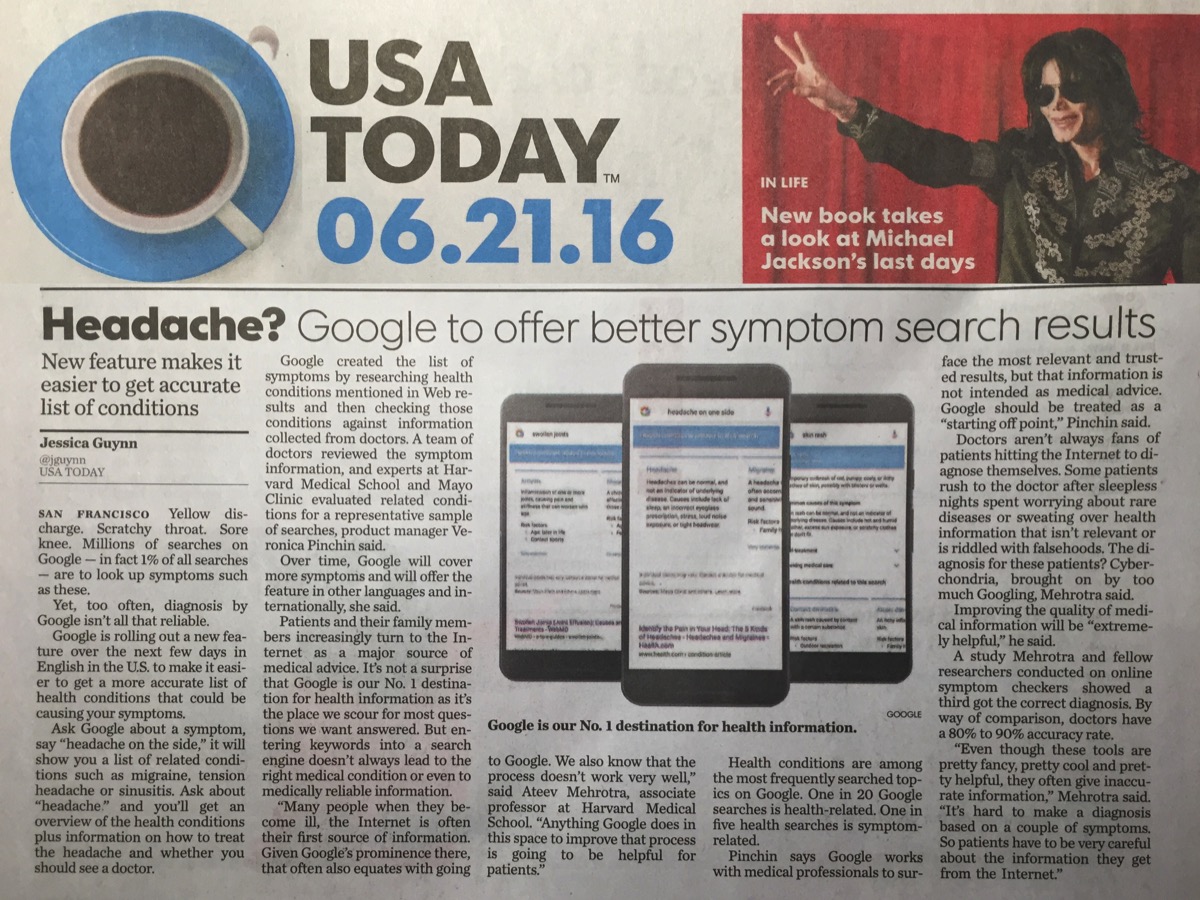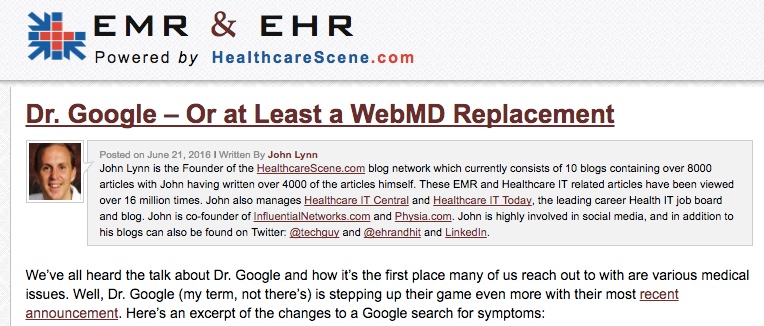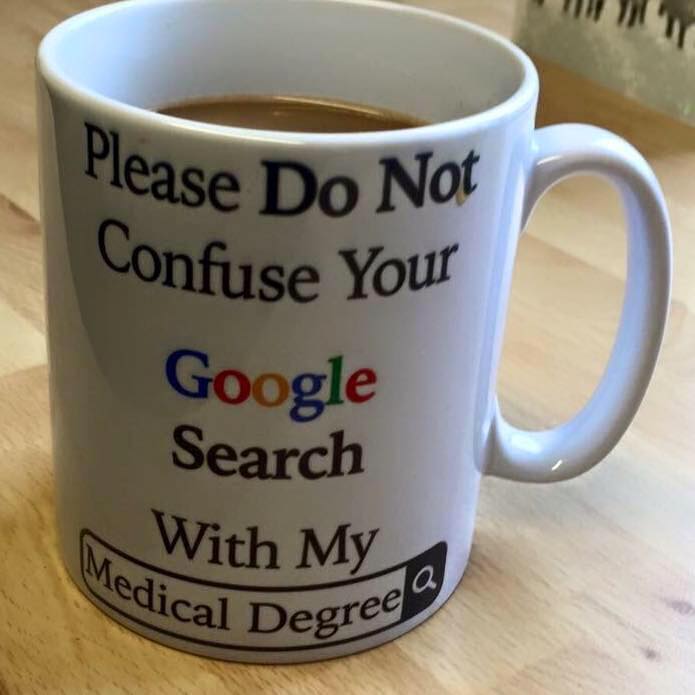
Click to read story on USA Today site. (This image is a composite of the page 1 banner (nameplate) and the inside-page Google story.)
Regular followers of this blog know for years we’ve been hot on the trail of the never-ending search for truth, justice, and please some reliable advice on medical matters. Tonight a google alert alerted us to the next round, the next attempt: a column by the ever-vigilant John Lynn at EMR & EHR (see screen capture below), who spotted the news that once again Google is doing its best to upgrade what you get when you google a symptom – a noble pursuit.
As always I googled the story about Google, and found this USA Today story.
Yes, upgrading search results is a noble pursuit. Yes, I like the idea of having someone curate search results so that what comes up is better than random chance.
But there are so many potholes on the road seeking certainty. In the interest of time, since I’m speechwriting tonight, I’ll paste in here what I said in the comments, which is a partial list of what we’ve said here in the past:
 John! THANK YOU for pointing to that Google Mug post – one of the most-commented things ever on the blog of the Society for Participatory Medicine, including some *epic* stories where informed patients brought invaluable added info to their own case … sometimes against the wishes of benighted practitioners.
John! THANK YOU for pointing to that Google Mug post – one of the most-commented things ever on the blog of the Society for Participatory Medicine, including some *epic* stories where informed patients brought invaluable added info to their own case … sometimes against the wishes of benighted practitioners.
I have so many thoughts on this issue, and the USA Today article.
First, didn’t this Google-Mayo “info box” thing start a year or two back?? –Ah, how fitting: googling tells me yes,Google to reshape how it provides health information, Mayo Clinic joins as a partner … Feb 2015, with this lede: “Google will today start presenting healthcare information in a new way…”
Second, has anyone disclosed whether there’s any money changing hands here? I’m not necessarily opposed to it but we info-consumers who are being served a curated dish sure deserve full disclosure, as in all medical money / influence topics, eh.
Third, is there a way for a googling e-patient to report “Sorry, you’re wrong,” or missing information, the way there is in Google Maps and other Google products? If not, it’s a dead-on blindered #fail from the start … “fail” as in “I’m the authority, don’t tell me I’m wrong,” which is deadly.
Fourth, the USA Today piece says Google will never be as trustworthy as docs – I call an apples/oranges violation.? People don’t receive a wrong prescription from Google, or undergo inappropriate or unnecessary surgery from Google … and MOST people assume a doc *is* correct, and only a fool would assume Google is sure to be right. (Of course yes, some people are fools.)
btw, I sure wish USA Today had cited the Society to Improve Diagnosis in Medicine. [SPM board member Peggy Zuckerman is also a board member there.]
So glad you wrote about this. So meaty. I must blog about it – maybe I just drafted it…
I forgot to mention – I wonder if the Belgian government will now take down its notorious “Don’t google it” Google Ad campaign! Lucien Engelen’s post about it, one of the award-winning big-money ad agency commercials for it, and the other big-money commercial.
Ah, ye who seek certainty – good luck with that. We must search together, diagnose together, stay together. Did I mention The Half-Life of Facts? http://lmgtfy.com/?q=half-life+of+a+medical+education
By the way, last year’s article said one in 20 Google searches was for health information (5%) while the USA Today piece says 1%. Hm?
A related note: last July we explored online symptom-checker websites, in A Turing test for diagnosis? The BMJ evaluates online symptom checkers. These sites (try to) go much deeper than a mere Google search, but as the article shows, it’s nuanced and tricky.
One last thing: anytime anyone talks about what patients do and don’t do online, check the authority – the Pew Health Tips page, a summary of the work of the excellent Susannah Fox when she was at Pew. It has a friendly URL: bit.ly/pewhealthtips
I’m all for Google upgrading their search results to “better than random,” but it’s demonstrably wrong to infer that any one source will reliably have the right answer; the truth is that truth is an ongoing search. e-Patients know this, and should continue to know it. And I hope all parties will recognize that certainty is elusive, as I said above: “We must search together, diagnose together, stay together.”







Some great questions e-Patient Dave. The question of financial relationship is very interesting. Those organizations don’t do much for free, so we can assume that Google is paying them for their work.
I did read that Google will ask the patient if the information they received in the search results was “helpful.” Not sure that response is that valuable, but they are trying to listen to the patient like you mentioned.
I agree wholeheartedly about the apples and oranges comparison of doctors vs Dr. Google or other online data.